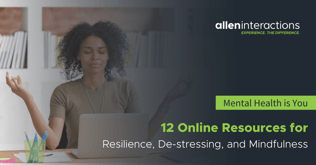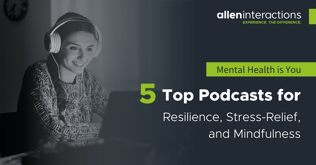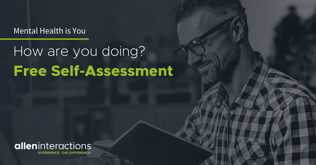Blog
Mental Health is You - 12 Online Resources for Resilience, De-stressing, ...
Do you ever think that you may be the first step in someone else's healing journey? When we think of providing first aid to those in crisis, our ...


Mental Health First Aid is “YOU”
By Dr. Christina Barss | January 07, 2021 | Custom Learning | 1 Comment
Do you ever think that you may be the first step in someone else's healing journey? When we think of providing first aid to those in crisis, our thoughts tend to be a simple band-aid or something more complex, like CPR with the Heimlich Maneuver.
In today's pandemic crisis where anxiety, isolation, and stress are at an all-time high, what people may need is an emotional bandage in the form of Mental Health First Aid (MHFA). And that MHFA is YOU.
People require your ear, your kindness, and your empathy. This first aid skill set is pushing societal judgment away and relieving the stigma of mental health challenges. From the Canadian province of Saskatchewan school system to a North Carolina barber shop school to University College Dublin, Ireland, Mental Health First Aid (MHFA) is gaining prominence. MHFA is democratizing mental health care to all, notably the marginalized and underserved populations.
What is Mental Health First Aid?
Mental Health First Aid (MHFA) is a skills-based training course that teaches participants about mental health and substance-use issues. The MHFA certification program learning objectives include how to recognize mental health problem symptoms, how to give help in a psychologically safe manner, and provide guidance to the appropriate professional help. It is an eight (8) hour program that may be delivered via instructor-led, hybrid, or e-learning. Research demonstrates that MHFA training has positively impacted mental health literacy and successfully decreased the stigmatization toward mental health challenges.
Why Mental Health First Aid?
Recognizing mental health concerns can be difficult. MHFA helps people become cognizant of the warning signs and risk factors. This is important because while one in five Americans has a mental illness or substance use disorder, many do not seek appropriate care.
Reasons for not seeking appropriate mental health care:
- Feeling stigmatized
- Reluctant to seek help
- Lack of advocacy
The individual or their network does not know how to intervene or direct the person to proper treatment
The most important reason for MHFA is timing; helping those in need get the help they deserve is imperative before it is too late.
Is this something new?
Mental Health First Aid was conceptualized by Anthony Jorm, at the October 1997 National Workshop on Depression in Australia. Later in 2000, he partnered with Betty Kitchener to launch the Mental Health First Aid Program. In 2002, the first published trial and premier MHFA Manual was published. By 2019, MHFA programs existed in over 24 countries.
In 2008, MHFA was brought to the U.S. by the National Council for Behavioral Health. To date, more than 2 million people in communities the National Council for Behavioral Health across the country have been trained in Mental Health First Aid through a network of more than 12,000 certified Instructors. (The end of this blog provides key links for more information.)
Where is Mental Health First Aid being practiced?
Earlier I referenced three examples of MHFA in practice. And before we expand on those examples, it's important to note that MHFA has been taught to a wide range of audiences and continues to gain momentum. Current learners/advocates include health, human services, and social workers; employers and business leaders; first responders; faith community leaders; college and university staff and faculty; law enforcement and public safety officials; military members, veterans and family members. Individuals with mental illness and addiction and their families have benefited from MHFA training.
1. Canadian province of Saskatchewan – Students
As recently as Wednesday, December 2, 2020, the Government of Saskatchewan committed $400,000 to ensure mental first aid was available to K-12 students like first aid (Toronto Star, 2020). The Saskatchewan Ministry of Education’s goal is to have at least one staff member in each Saskatchewan school. The Mental Health First Aid (MHFA) Training will build staff capacity related to mental health and student safety. The training will be provided online to remove barriers to access. MHFA was a recommendation from the Minister’s 2019-20 Youth Council.
2. Charlotte, NC No Grease Inc. – Communities
Professional barber, Damien Johnson, co-owner of No Grease Inc., adopted MHFA for his staff in response to his 22 years of active listening to those in his barber chair. “There’s a level of intimacy with barbering,” Johnson says. “It comes along with the business. We have no choice, and people share that with us” (Facebook, 2018). At No Grease, the MHFA training helps his staff with identifying a person in need of mental health assistance and the appropriate materials, like pamphlets or resource referrals to share with customers.
MHFA delivered via a “culturally competent” context helps to address the problems of unequal access to services and the fear of stigma. This is important because of African Americans who need mental health care, only one in three receive it. MHFA is a simple and effective way to remove barriers and address social and economic challenges such as: poverty, unemployment, and racial discrimination.
3. University of College Dublin – Staff
This implementation of MHFA is in response to senior leadership recognizing the increase in stress and student safety challenges of academic campus staff. In 2019, the University College Dublin launched a campus community initiative to promote positive mental health at work, focusing on employee wellbeing. The MHFA Peer Support Group goal is to create an atmosphere of psychological safety where any UCD employee may feel supported when experiencing issues of a mental health nature. MHFA Ireland will provide the MHFA certification training for all peer support group members.
How can I learn more?
Mental Health First Aid is YOU. You can help spread Mental Health First Aid to your community and across the country. Read more about the Mental Health First Aid Act to learn how.
To find a course or contact an Instructor in your area, visit www.MentalHealthFirstAid.org.

About the Author: Dr. Christina Barss
Dr. Christina Barss is an experienced industry subject matter expert in improvement sciences and organizational culture change. Her unique blend of practical, academic, and art perspectives creates custom operational and employee engagement solutions that transform the bottom line. For example, her PhD in sustainable systems design focused on disparately located interprofessional teams in transition during lean transformation at a large, midwestern, urban, academic medical center. Dr. Barss' 12 years in healthcare were filled leading strategic enterprise-level initiatives to improve patient safety, quality, service, and innovation as well as teaching and coaching executives. From C-suite to frontline, she connects seamlessly and guides others in building trust bridges. Her continuous improvement science foundation began in the manufacturing industry. She presents nationally and internationally on design thinking, change management, organizational culture, corporate learning, executive education, and succession planning.
Comments
Thats right to control our mental health first this is our priority https://dubaimachines.com
Would you like to leave a comment?
Related Blog Posts

By: Dr. Christina Barss | Sep, 2021
Category: Custom Learning, Strategic Consulting

Blog
Mental Health is You - 5 Top Podcasts for Resilience, Stress-Relief, and ...
Do you ever think that you may be the first step in someone else's healing journey? When we think of providing first aid to those in crisis, our ...
By: Dr. Christina Barss | Jun, 2021
Category: Custom Learning, Strategic Consulting

Blog
Mental Health is You - How are you doing? Free Self-Assessment
Do you ever think that you may be the first step in someone else's healing journey? When we think of providing first aid to those in crisis, our ...
By: Dr. Christina Barss | May, 2021
Category: Custom Learning, Strategic Consulting


Abira Wahab
1/13/2021, 4:48 AM